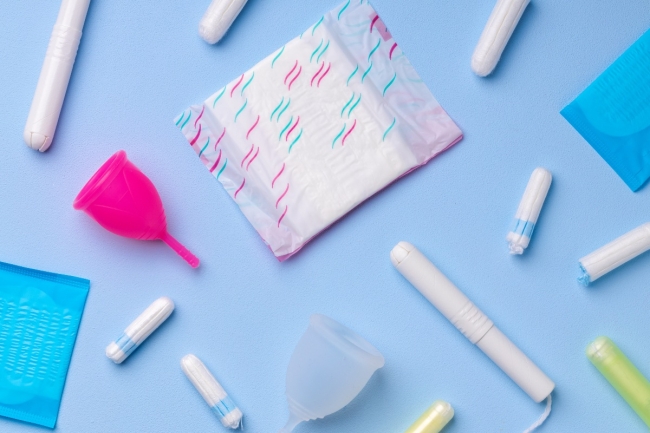You have /5 articles left.
Sign up for a free account or log in.

At Sacramento State University, students can already get free menstrual products at the university’s food pantry and health center.
iStock/Getty Images Plus
When the California Assembly introduced legislation earlier this year that would require community colleges and California State University campuses to provide students with free menstrual products, Samantha Elizalde wanted to show her support.
A student at Sacramento State University and president of the student government, Elizalde spearheaded an effort last spring for the organization to write a resolution supporting the legislation, known as AB 367.
It’s an issue she knows well: two years ago, she and other Sacramento State students started a pilot program to put free tampons and sanitary pads in the university’s gender-neutral bathrooms.
“Period poverty is a real thing,” Elizalde said. “Not everyone has access to menstrual products. I know sometimes people consider them a luxury, but they are a basic need for all people who menstruate.”
She was thrilled when, on Oct. 8, California governor Gavin Newsom signed the legislation into law.
Sponsored by Assemblymember Cristina Garcia, AB 367, known as the Menstrual Equity for All Act of 2021, requires the California State University system -- which has 23 campuses across the state -- and community colleges to stock free menstrual products for students in at least one central location on each campus, starting in the 2022-23 academic year. The legislation also “encourages” the regents of the University of California and private higher education institutions to follow suit.
“Often periods arrive at inconvenient times,” Garcia said in a press release after Newsom signed the bill. “Having convenient and free access to these products means our period won’t prevent us from being productive members of society, and would alleviate the anxiety of trying to find a product when out in public.”
The state -- not the institutions themselves -- will foot the bill for supplying the free menstrual products, since the California Constitution requires the state to reimburse institutions for costs it mandates.
At Sacramento State, students can already get free menstrual products at the university’s food pantry and health center, said Sandra Gallardo, executive director of Associated Students Inc., the official governing body of Sacramento State students. However, Gallardo hopes the legislation can help institutions expand access to the products and make them available in more campus locations. She said her department was excited to see the legislation pass.
“We’re completely supportive,” Gallardo said. “Students took a stand in the spring in support of this, so Associated Students stands in support of this law.”
It’s unclear what it might cost the state to supply a university like Sacramento State. “Time will tell,” Gallardo said -- it depends on how popular the free products become.
Elizalde noted that a group she joined during her first year of college, Mujeres Ayudando La Raza -- Women Helping the Race -- has been supplying free tampons and sanitary napkins on campus for two years, raising money to purchase and stock the products in bathrooms. “There’s a need there,” Elizalde said.
Though the legislation doesn’t mandate that the regents of the University of California stock menstrual products, Sara Blair-Medeiros, associate director of the Women’s Resources and Research Center at UC Davis, said her institution was among the first in the state to facilitate student access to menstrual products. The Women’s Resources and Research Center and the university’s LGBTQIA+ Resource Center have been providing free menstrual products, she said. Additionally, one student organization, Davis Period, stocks free menstrual products in university bathrooms and partners with local organizations to give community members as well as students pads, tampons and menstrual cups. The group holds fundraisers and events to provide menstrual-product care packages for anyone who needs them.
Additionally, Blair-Medeiros said the founding members of Davis Period started Free the Period, a coalition of organizations that pushed for AB 367 to become law. And in 2020, Blair-Medeiros said, the university created a Menstrual Equity Task Force to make recommendations to university leadership -- which are currently being reviewed.
“One of the important things to understand is that this bill feels like things coming full circle,” Blair-Medeiros said. “What is happening here at UC Davis is a full community effort, and it has been a pleasure to work with our campus partners.”
According to a survey commissioned by Thinx, a feminine hygiene company, and PERIOD, a nonprofit that seeks to eradicate period poverty, 84 percent of U.S. students have either missed class time or know someone who missed class time because they did not have access to sanitary products. The survey, which spoke to 1,000 teenagers who menstruate, also found that one in five teens has struggled to afford period products or was not able to purchase them at all.
Even for those who can afford the products, the cost adds up. A poll commissioned by INTIMINA, a menstrual cup and feminine hygiene company, found that the average person who menstruates spends $13.25 a month on menstrual products, which can add up to $6,360 in their reproductive lifetime, from roughly age 12 to 52. The INTIMINA survey of 2,000 women also found that 72 percent think the government should mandate free menstrual products for everyone.
The new bill is not the first time Newsom has addressed the issue of menstrual equity. In 2019 he signed legislation that repeals until Dec. 31, 2021, a tax on menstrual products, estimated to have cost menstruating people in the state a total of $20 million a year. Similar laws have been introduced in 20 other states.
To help mitigate the cost for college students, universities in places where there is no statewide law have launched their own initiatives to provide free menstrual products on campus. They include the University of Minnesota, which began providing free menstrual products in restrooms in 2007. In 2015, the University of Nebraska at Lincoln began offering tampons and sanitary pads in feminine-product dispensers free of charge.
Elizalde said she hopes AB 367 serves as a framework for other states to implement at public institutions.
“Period poverty is not only in California, and not even just the United States. It’s a global issue,” Elizalde said. “So I hope this sets a precedent for other states to adopt so we can bridge the gap when it comes to period poverty.”




